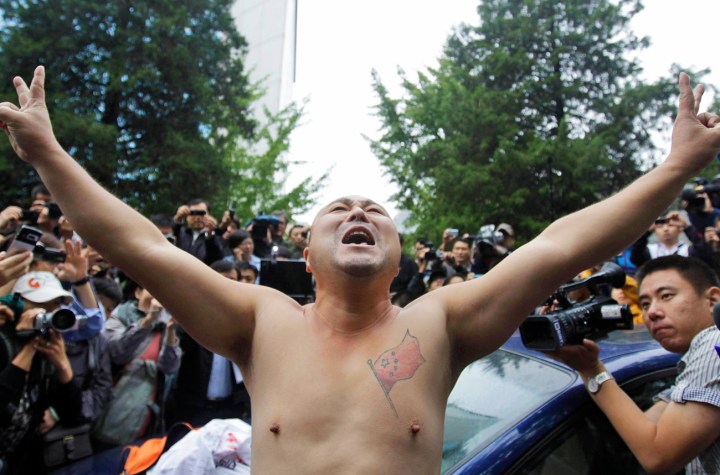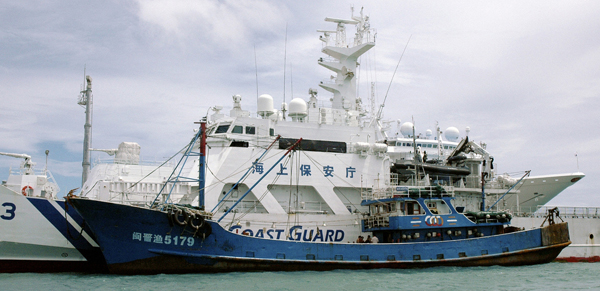Politics
Kung-Fu vs Karate: Far East relations in the 21st century

Even finding the eight tiny Senkaku (if you are Japanese) or Diaoyu (if you are Chinese) Islands (and rocks) on a map can be a bit of a mission. Regardless, Japan and China are now in a big dustup over the territorial status of these near-microscopic islands that just happen to be surrounded by excellent commercial fishing grounds – and may also be the site of oil and natural gas deposits. By J BROOKS SPECTOR.
The current incident began on 8 September when a Japanese coastguard vessel was damaged in collision with a Chinese boat near one of these islands. The Japanese then took the Chinese crew into custody, charging the Chinese captain, Zhan Qixiong, with deliberately ramming two Japanese patrol boats. After a few days, the Japanese released the 14-member crew of the Chinese ship, but they are still holding the captain and have extended his detention for ten more days. Not surprisingly, the Chinese are increasingly insistent their skipper must be allowed to go home.
Japanese chief cabinet secretary Yoshito Sengoku said this incident should not be allowed to be a pretext for stoking up the fires of “extreme nationalism” between the two nations and that the Japanese wanted to use all possible diplomatic channels to prevent any escalation of the confrontation. But Sengoku also added that the captain’s case was now a domestic legal matter since it took place in waters the Japanese claim as theirs, and the Japanese government’s task now was to get the Chinese to be more appreciative and understanding of Japan’s judicial and political system – or, if he did the crime, well, maybe he’ll just have to do the time.
For its part, the Chinese foreign ministry has a slightly different view. They charged that Japan had “seriously damaged Sino-Japan bilateral relations” and they suspended a whole slew of exchanges and discussions between Chinese provincial and central government officials and their Japanese counterparts, including talks about additional air routes. The Chinese also cancelled vice chair of the Standing Committee of the National People’s Congress Li Jianguo’s long-planned official visit to Japan and the visit of a thousand young Japanese to the Shanghai Expo is off as well. A Chinese foreign ministry spokesman added, just in case the message wasn’t clear enough: “We demand the Japanese side immediately release the Chinese captain unconditionally. If the Japanese side clings obstinately to its course, making mistake upon mistake, then China will take strong countermeasures and Japan will bear all the consequences.”

Photo: A Chinese fishing boat (blue), flanked by the Japan Coast Guard patrol vessel Yonakuni, is moored at Ishigaki port on the southern Japanese island of Ishigaki September 9, 2010. Japan on Monday freed the crew of a Chinese fishing boat detained last week in disputed waters, but held onto the captain at the centre of a territorial rift between the two neighbours. Picture taken September 9, 2010. REUTERS/Kyodo
These two nations now have themselves one nasty little dispute and they are doing what countries do when they have one of those “You did so”, “I did not”-style diplomatic exchanges. The way things are now unfolding, Chinese premier Wen Jibao and Japanese prime minister Naoto Kan aren’t going to be sharing any quiet moments on the margins of the soon-to-open UN General Assembly either.
The current dispute is, of course, more than just a shouting match about which ship failed to give way. It really rests on a much deeper dispute about natural gas exploration rights in the surrounding East China Sea as well as commercial fishing activities. And the dispute also has origins in over a hundred years of East Asian history and warfare.
Way back, these basically uninhabited islands were nominally under a kind of vague governance by the Ryukyu Island kingdom on Okinawa that was, itself, a Chinese tributary state for hundreds of years. When a newly-expansionist Japan emerged from the Meiji Restoration in 1868, they soon annexed Okinawa and the nearby islands. The Japanese claim to the Senkaku/Diaoyu Islands became concrete after their military defeat of China in 1895. Taiwan was the main Japanese war prize, but this also ensured the Senkaku/Diaoyu Islands were now firmly Japanese territory.
After World War II, Taiwan was taken from Japan and restored to China but the specific terms of surrender did not refer to the Senkaku/Diaoyu Islands. Instead, they were administered as part of the US military administration of Okinawa and the rest of the Ryukyus until 1971 when Okinawa reverted back to Japan, thereby setting up the background for today’s dispute.
Now, if the Senkaku/Diaoyu Islands were just a resting spot for pelicans and seagulls, or a stationary life raft for the occasional shipwrecked fisherman, it probably wouldn’t matter too much who owned them. But then there is the likelihood of natural gas, maybe oil – and all those fish just dying to become sushi and sashimi. The Japanese have long argued that China raised no objections to the reversion to Japan almost forty years ago, and that China (and the Taiwanese government which has inherited the Nationalist Chinese claims to the same islands as well) only started to raise its claim when the possibility of undersea oil came into view.
While all this has been going on, Japan also turned back a boat of Taiwanese activists who were sailing to these same islands to claim Taiwanese sovereignty over them. This, of course led to the inevitable burning of a Japanese flag in Taipei in front of the Japanese government liaison mission there. In an inventive touch, they also pelted the Japanese office building with fish.

Photo: An activist hurls a dead fish during a protest in front of the Japan Interchange Association, the de facto Japanese embassy, in Taipei, September 14, 2010. The activists claim sovereignty of a group of disputed East China Sea islets — called Senkaku in Japan, Diaoyutai in China and Tiaoyutai in Taiwan — after a Chinese fishing boat captain was detained by Japan following a collision with two Japanese coast guard boats last week. REUTERS/Pichi Chuang
One immediate outcome of this fracas will be to complicate attempts by the two countries to sort out the exploration for oil and natural gas in the East China Sea that both claim the right to exploit. But this newest Chinese-Japanese tension comes on top of some long-time Chinese annoyance about those yearly commemorations at the Yasukuni Shrine that honour the souls of Japan’s military casualties (usually described instead as war criminals if you happen to be Chinese) from World War II.
And there are also the facts that a resurgent China has been flexing its military muscle in its “near abroad”, and reasserting claims to bits and pieces of territory and all those island groups in the South China Sea – islands that happen to be much further from China than the Senkaku/Diaoyu Islands are. A growing Japanese anxiety about this has been one reason that Japan’s year-old Democratic Party government, now under the newly re-elected prime minister Naoto Kan, toned down its calls for an East Asian community, and instead has sought to strengthen ties with Washington, its long-time protector.
Adding an extra frisson to this, of course, is that Japan’s new foreign minister, Seiji Maehara, has a reputation for foreign affairs toughness and a publicly expressed reluctance to bend to Chinese pressures such as are likely to come in this current tussle. Maehara has also expressed his view that it is time Japan amended its pacifist constitution and nurturing closer ties with the US.
While Maehara has inherited the difficult task of relocating the US Marine air base at Futenma on Okinawa, his first and even more important job may be dealing with China and the repercussions of the current dispute. Maehara told a news conference on Tuesday that “territorial problems do not exist in the East China Sea. We will simply take a rigid and resolute response in order to firmly defend Japan’s sovereignty, while we take strict measures based on our domestic law. It’s as simple as that.” If only it were.
Commenting on Maehara’s likely approach in dealing with this problem and China more generally, Koichi Nakano, a political science professor at Sophia University in Tokyo explained Maehara “is probably temperamentally or ideologically not inclined to succumb to Chinese pressure. He’ll probably stick to his guns, though I am sure he will try not to further escalate the tension.” And at least some of the Japanese press has joined in the tough talk as well. Japan’s biggest newspaper, the Yomiuri Shimbun, a vigorous supporter of the US alliance and a strong Japanese defence posture, commented editorially that “if China thinks that by taking a strong stance that Japan will just roll over, then it is mistaken.”
But Chinese analysts like Wang Xiangsui of the Center for Security Strategy at the Beijing University of Aeronautics and Astronautics retort that the Chinese government has decided that the Japanese are “trying to get China to eat the bitter fruit” of its sovereignty over the islands. “They want China to accept the fact that they control the islands.” As a result, this dispute may well be a template of the dynamic for Japanese – Chinese relations in the 21st century – and nations around the world should to be prepared for the reverberations that will follow. DM
For more, read the BBC, the BBC, the BBC, the New York Times, the New York Times, the Japan Times, the Japan Times, the China Daily, and the China Daily.
Also: A previous column by New York Times columnist Nicholas Kristof about this dispute elicited a ringing, extraordinarily detailed defense of the Japanese position. For more information on foreign minister Seiji Maehara, see Wikipedia, and MSNBC.
Main photo: A man shouts slogans during an anti-Japan protest over disputed islands called Diaoyu in China and Senkaku in Japan, near the Japanese embassy in Beijing September 18, 2010. REUTERS/Jason Lee





 Become an Insider
Become an Insider